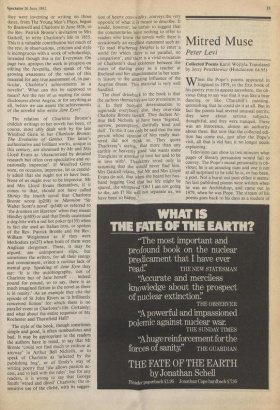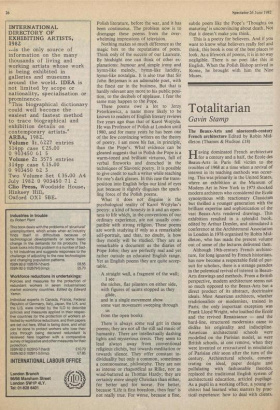Mitred Muse
Peter Levi
when the Pope's poems appeared in England in 1979, in the first book of his poetry ever to appear anywhere, the ob- vious thing to say was that it was like a bear dancing or like Churchill's painting, astonishing that he could do it at all. But in fact the poems had several unusual merits; they were about serious subjects, thoughtful, and they were tranquil. There was an innocence, almost an authority about them. But now that the collected edi- tion has come out, just after the Pope's visit, all that is old hat; it no longer needs explaining.
Television can show in two minutes what pages of literary persuasion would fail to convey. The Pope's moral personality is ob- vious; he is an amazing man and one is not at all surprised to be told he is, or has been, a poet. Not a burnt out poet either it seems: his last published poems were written when he was an Archbishop, and came out in 1979, when he was Pope. The stream of his poems goes back to his days as a student of Polish literature, before the war, and it has been continuous. The problem now is to disengage these poems from the over- whelming impressions of television.
Nothing makes so much difference as the magic box to the reputations of poets. Think only of the success of our Laureate. By hindsight one can think of other ex- planations: humour and simple irony and hymn-like melody, hymn-like lucidity, hymn-like nostalgia. It is also true that Sir John Betjeman is an admirable poet, with the finest ear in the business. But that is hardly relevant any more to his public posi- tion, to the decibels of applause. I fear the same may happen to the Pope.
These poems owe a lot to Jerzy Peterkiewicz, a name more likely to be known to readers of English literary reviews five years ago than that of Karol Wojtyla. He was Professor of Polish at London until 1980, and for many years he has been one of the few convincing writers on the theory of poetry. I am more his fan, in principle, than the Pope's. What evidence can be gleaned suggests that in Polish the Pope is a warm-toned and brilliant virtuoso, full of verbal fireworks and drenched in the techniques of Slavonic poetry. It is possible to give credit to such a writer while reaching for one's dark glasses. In this case the trans- position into English helps our kind of eyes just because it slightly disguises the spark- ling force of the Polish poems.
What it does not disguise is the psychological reality of Karol Wojtylas's poetry: a kind of honesty in it and an open- ness to life which, in the conventions of our ordinary experience, are not usually com- patible with strong religion. These poems are worth studying if only as a remarkable self-portrait, and that, no doubt, is how they mostly will be studied. They are as remarkable a document as the diaries of Pope John; they are perfectly real and yet rather outside an educated English range. Yet as English poems they are quite accep- table.
A straight wall, a fragment of the wall; I see
the niches, flat pilasters on either side, with figures of saints stopped as they glide, and in a single movement show some vast movement sweeping through us from the open books There is always some real grit in these poems; they are not all the still sad music of humanity. There are intellectually dashing lights and mysterious crests. They seem to lead always away from conventional religious cliches, but towards meditation or towards silence. They offer constant in- dividuality but only a common, sometimes a commonsense, philosophy. They are not as intense or rhapsodical as Rilke, nor as wind-battered as Thomas Hardy; they are certainly more simply Christian than either, for better and for worse. For better, because 'Life is first boredom, then fear' is not really true. For worse, because a fine, subtle poem like the Pope's 'Thoughts on maturing' is unconvincing about death. Not that it doesn't make you think.
This is a poetry for believers. And if you want to know what believers really feel and think, this book is one of the best places to look. As a lifework of poems, it is in no way negligible. There is no poet like this in English. When the Polish Bishop arrived in Rome, he brought with him the Nine Muses.























































 Previous page
Previous page